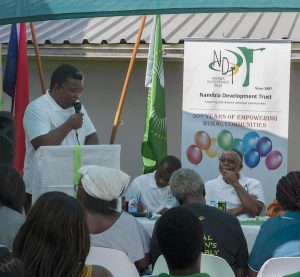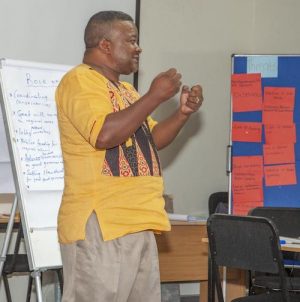 By Ronny Dempers, the Executive Director of Namibia Development Trust, which, through a people-centred approach to development, increases the capacities and livelihoods of marginalized communities and empowers them to act for socioeconomic justice and social change. He’s also on the Board of the Orange River-Karoo Conservation Area, based in Namibia, and has been the chairperson of NACSO (the Namibian Association of CBNRM Support Organisation), a consortium promoting Community Based Natural Resource Management (CBNRM) in Namibia.
By Ronny Dempers, the Executive Director of Namibia Development Trust, which, through a people-centred approach to development, increases the capacities and livelihoods of marginalized communities and empowers them to act for socioeconomic justice and social change. He’s also on the Board of the Orange River-Karoo Conservation Area, based in Namibia, and has been the chairperson of NACSO (the Namibian Association of CBNRM Support Organisation), a consortium promoting Community Based Natural Resource Management (CBNRM) in Namibia.
The context for philanthropy related to working with communities

Ronny Dempers speaks at the 30th Anniversary of Namibia Development Trust.
Namibia’s global economic status is ranked by the World Bank and other international institutions as an “upper middle income country,” but that’s misleading. Namibia does have financial resources, domestically, that can be tapped into for philanthropy, but that wealth is owned and shared by a very small minority. The great majority of people in Namibia live in abject poverty and unemployment rates are very high. I must also say that policies and legislative frameworks in Namibia aren’t conducive for tapping into the wealth of the minority.
Also, because of the “upper middle income” status, there aren’t many foreign donors that are eager to fund development activities. After independence, in 1990, the honeymoon of increased donor funding ended, and many donor institutions have withdrawn from the country.
Private-sector funding is also limited, because there are very few incentives to attract private funding to nonprofit activities. The private sector channels a lot of funding into sports development and activities related to marketing. The nonprofit sector finds it very hard to raise funds from these domestic sources.
Barriers to the nonprofit sector
“Philanthropy” isn’t a formally used concept in Namibia, even in the nonprofit sector, but there are foundations and social-development programs. We’ve seen a trend in Namibia: instead of putting funds into existing non-governmental organizations (NGOs), private companies set up their own internal foundations, such as the Pupkewitz Foundation.
The private foundations implement their own social responsibility programs, with their own corporate goals.
Government para-statal agencies also have their own foundations. That’s another trend developing in Namibia. They’re primarily funded by the government, and specialize in a particular sector, such as transportation, telecommunications, the energy sector and the diamond industry.
These trends make it difficult for the nonprofit sector to start substantial development work for communities living in poverty.
Policy and regulatory challenges

Ronny Dempers talks about the Small Grant Programme, during a workshop with the Conservancy Regional Association, in Namibia.
To avoid getting grey-listed, Namibia had been forced into a situation where it had to upgrade and update its policy instruments. Parliament has developed and passed through legislation — I think there were 12 acts that were updated and bulldozed through Parliament — without proper citizen participation and without following some parliamentary processes, such as creating committees for civil society to give input. We have a strange political system in Namibia in which our Parliament is dominated by the executive when it comes to creating laws.
For example, the Financial Intelligence Act put restrictions on how nonprofit organizations are regulated, how they should be managed, and even how they should do their banking. It’s quite a process for a nonprofit organization to open a bank account. And it’s difficult to even register a nonprofit. Some of the requirements are so difficult, and some of the potential penalties are so strict, that some nonprofits, including mine, are registered as a trust.
Potential solutions
NGO’s need to advocate for a more enabling environment that would include, among other things, unlocking domestic resource mobilization for the NGO sector. Also, the government of Namibia is currently developing a Civil Society Partnership and Engagement Policy for 2024-2027. This provides an opportunity to improve the enabling environment for civil society in Namibia.
Ronny Dempers can be found at Namibia Development Trust. Photos are courtesy of the Orange River-Karoo Conservation Area and the Namibian Association of CBNRM Support Organizations.
Read another story in this series: African Philanthropies: Our Narratives, on Our Terms.
Monday, June 17, 2024 in Africa Philanthropy Series, For homepage, News & Events
Share: Twitter, Facebook



